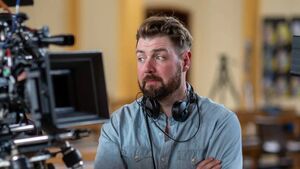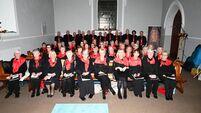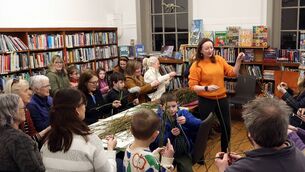Dating Amber was game changer for Kildare filmmaker

Filmmaker David Freyne
IF NEWBRIDGE-born film director David Freyne had made when he first wanted to, he thinks it would have painted a very harsh view of the place and time where he grew up.
He says today that not having the money to make it then was a blessing in disguise and prevented him from producing a film that “wouldn't have been honest”.
“It was at one point going to be my first film but it didn't happen and so I waited. When you're a young man you just kind of desperately want to leave and never see your home place again.
“But with hindsight, I realised what an actually funny and lovely place it was. I was older, and I had a much more kind view of both Kildare and my childhood there, I think."
David was fascinated with the world of films since he was a teenager and recalls how he spent his time then in video rental stores.
"For some reason we had a great world cinema section in the Xtra-vision in Newbridge and I kind of devoured everything I could get my hands on. Wanting to be a filmmaker but not knowing quite how to go about it."
Only after he finished his second level education in Cross and Passion College Kilcullen — “they didn't have a Film Club then” — did he begin to see the way.
"I went to UCD and started to meet like-minded people and to make short films.
"Then I did a Master’s in Film there, and that's where I realised this is something that you can actually, potentially, make a living out of."
The key word there is 'potentially'. As in any area of the arts, the film industry is never an easy place to make a living.
"It's a slow journey. There are lots of sacrifices along the way. Every filmmaker, every artist, every actor knows that. But it's also really a great community to be part of, and I wouldn't like to do anything else."
David's 'slow journey' took the road of directing six short films between 2010 and 2014, most of which had a horror or science fiction theme.
He also directed a four-part creative documentary for Setanta Sports featuring inspirational people overcoming disabilities by undertaking extreme sports.
In 2017, he made his first feature-length movie, , about a disease which had turned people into zombies.
Finally, , which he both wrote and directed, was produced in 2020. A coming-of-age story of teenage boy and girl best friends who pose as a straight romantic pair to hide the fact that they are both gay, the film was a turning point in several respects. Not least because David was able to get a high-profile cast.
"We sent it to Sharon Horgan early on, not really expecting to get a response. But within a week, she got back and said she loved it and wanted to do it. She was on board through the whole casting and financing process, and having the support of someone like her, who's so successful and so brilliant, just gives a big boost.
“Then Simone Kirby and Barry Ward came on, and after that we had a very thorough casting process to get the right young people — we really struck it with Lola and Fionn and the others. But all that really started with getting Sharon's stamp of approval."
The other change for David was that was produced as a comedy-drama, something he hadn't done before and which it likely wouldn't have been had he produced it at that unsettled earlier time in his life.
"I think it was where my brain really clicked in terms of the tone and the genres I wanted to go forward with, which is much more in the comedy-drama space. I don't think I'll be doing horror again anytime soon."
He's very aware that the release of opened opportunities for him.
"I think hitting the comedic, dramatic tone brought me to the attention of people I'd kind of dreamed of working with elsewhere. It's definitely been a game-changer for my career."
It brought him to , an American production which he was employed to direct and which will be released in November. It stars Elizabeth Olsen and Miles Teller. It's a fantasy about after death, where everybody gets one week to choose where to spend eternity.
"It's very funny. It's very moving. And, you know, it's essentially about what it is to be alive. It feels like a very natural next step from Dating Amber."
was shot outside Vancouver in Canada, where he says the main difference between there and the Curragh at home was the mountains around were much bigger.
He's very appreciative about the cast and crew he worked with during the six-month shoot.
"Any film is your cast and crew, and the Canadian crews, like the Irish ones, are incredibly talented and friendly.
"So, working in British Columbia was very similar to working on Dating Amber — the crews made both films a really fun and pleasant experience, not just for me but for everyone.
"It didn't feel any different working in North America than in Kildare, except that everything was much bigger."
David lives outside London, a city he loves. But one of the best things about it, he says, is that it's such a quick trip home.
"Ireland is always there, and it's so close to my family in Kildare. The six months I spent shooting in Vancouver, it was just so goddam far away."
is screening in Kilcullen during Pride Week, on 18 June, courtesy of the Lions Club's Kilcullen Bridge Cinema initiative.
Five years on, what does David think of the current space for LGBTQ people?
"It would be naive to say there isn't a regression, especially in England and America, and I think it's becoming far more insecure to be queer," he said.
“Ireland is definitely a better place than those to be gay. It's really supportive and Irish families are really welcoming of LGBTQ people, and that gives me hope and faith going forward.
“But I think the gay community has to be very vigilant, media and politicians are changing their attitudes towards us.
"I don't think we've lost the spirit that we had — this year marks the 10th anniversary of marriage equality, a seismic moment, and I think we still have that.
“As Irish, we know what it's like to come from a very conservative and frightening country for people who are different. I think in Ireland we now know how to embrace that difference."





